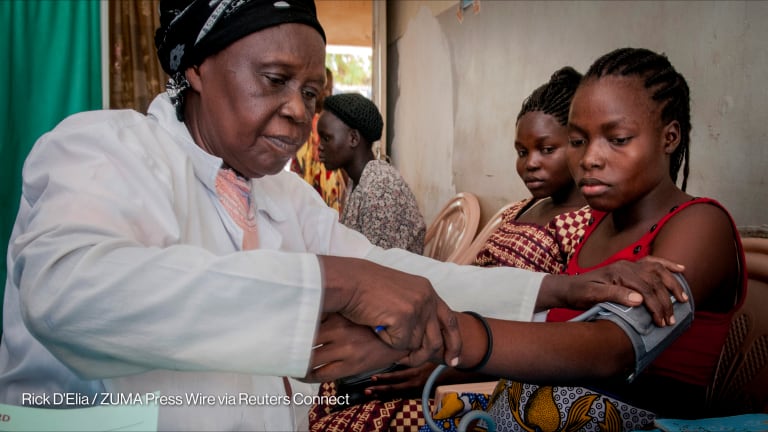
As we mark Health Workers Week 2025, it’s easy to forget that women make up 70% of the global health workforce. It is largely women who are at the front line, providing lifesaving care to communities in need. Our current global context for health means that women health workers face a double bind that not only threatens their ability to provide essential care but also undermines the progress we’ve made toward health equity.
This stems from two interconnected crises: The ongoing cuts to aid for global health, and the rollback of investments in gender equality. We ignore this unfortunate overlap at our own peril.
The crisis of aid cuts in global health
Reductions in global health funding, largely driven by political and economic shifts in donor countries, threaten the sustainability of critical health care systems, particularly in low- and middle-income countries. Women health workers, especially in LMICs, are often at the heart of health care systems that rely heavily on international aid. They will now have to do more with less — fewer resources, inadequate training, and increasingly heavy workloads.
The impact of the cuts goes far beyond logistics; it’s deeply personal for the women on the front lines. Many health workers, particularly those in remote or underserved areas, already face systemic discrimination and bias. When aid is reduced, their ability to deliver quality care becomes compromised, leading to burnout, job dissatisfaction, and, ultimately, an exodus of women from the health care workforce. Not a single health system across the world can afford this resource drain.
A rollback of investment in gender equality
Simultaneously, we’re witnessing a rollback in global investments in gender equality. Gains made in recent years are under threat as global priorities shift and funding for gender equality initiatives shrinks. For women health workers, this is a direct challenge to their right to equal treatment, fair pay, and advancement in their careers.
Across the world, women occupy the most demanding and least-recognized roles in health care. They make up the majority of nurses, midwives, and community health workers, yet their positions are often undervalued, underpaid, and lack the support they need to succeed. This underinvestment in gender equality risks stalling progress in global health but also exacerbates existing health disparities.
The double bind: A global health crisis
In India, recent cuts to the Integrated Child Development Services program have hindered the delivery of essential services. Reduced funding has caused delays in supplies such as vaccines and nutrition supplements, making it harder for Anganwadi workers, or community health workers, to perform their roles effectively. Many face low wages and job insecurity, prompting them to leave for better opportunities.
Similarly, in Kenya, budget cuts to the health sector have severely affected the CHW program. Among many areas affected, there are concerns about a decrease in the number of CHWs in rural areas, coupled with limited medical supplies and fewer training opportunities, hindering their ability to provide quality care and advance in their careers.
On one hand, women are being asked to do more with less as global health funding dwindles. On the other hand, they are facing systemic discrimination that limits their ability to advance and thrive in the profession. This combination is toxic and unsustainable and threatens to undo any progress made on creating an equitable and sustainable workforce
How do we break the double bind for women health care workers?
Investment in health systems and women health workers: We need a renewed commitment to financing global health systems, particularly those in LMICs. Furthermore, governments and international donors must prioritize funding that is specifically allocated to support the recruitment, retention, and leadership development of women health workers.
Gender-responsive health policies: Women health workers must be at the table when health policies are being made, and their voices must be amplified in discussions about the future of healthcare.
Championing women’s leadership: The world needs more women in leadership positions in global health. Women’s leadership should be viewed as essential for achieving better health outcomes, not as a secondary priority.
Community-level support: At the community level, we must support and empower women health workers with the protection, tools, and resources they need to succeed. By fostering an environment where women feel valued and supported, we can help mitigate the burnout and attrition that currently plague the workforce.
Conclusion
Health Workers Week calls on us to do much more for our global health workforce. If we care about the sustainability of our health systems, it’s time to break the double bind for women health workers. The global community must commit to investing in both health systems and gender equality, ensuring that women health workers are given opportunities to lead. True global health equity cannot be achieved without breaking the double bind for women health workers — it remains only half a truth.









